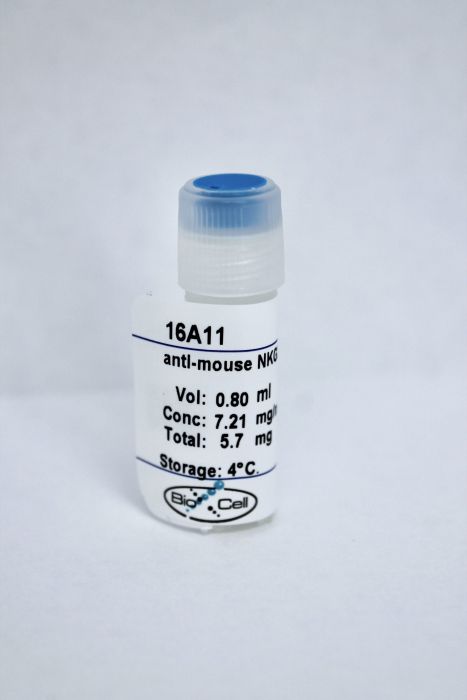InVivoMAb anti-mouse NKG2AB6
Product Details
The 16A11 monoclonal antibody reacts with NKG2A from C57BL/6 mice, the antibody does not react with BALB/c or 129 mouse strains. NKG2A, also known as CD159a is a type II transmembrane glycoprotein which belongs to the killer cell lectin-like receptor (KLR) family. NKG2A is expressed on NK cells, NKT cells, and activated CD8 T cells. NKG2A forms a disulfide-bonded heterodimer with CD94 that can bind to non-classical MHC class I antigen Qa-1 on target cells and inhibit NK cell activation.Specifications
| Isotype | Mouse IgG2b, κ |
|---|---|
| Recommended Isotype Control(s) | InVivoMAb mouse IgG2b isotype control, unknown specificity |
| Recommended Dilution Buffer | InVivoPure pH 7.0 Dilution Buffer |
| Immunogen | C57BL/6 mouse CD94/NKG2A transfected CHO cells |
| Reported Applications | Flow cytometry |
| Formulation |
PBS, pH 7.0 Contains no stabilizers or preservatives |
| Endotoxin |
<2EU/mg (<0.002EU/μg) Determined by LAL gel clotting assay |
| Sterility | 0.2 μM filtered |
| Production | Purified from tissue culture supernatant in an animal free facility |
| Purification | Protein A |
| RRID | AB_2894759 |
| Molecular Weight | 150 kDa |
| Storage | The antibody solution should be stored at the stock concentration at 4°C. Do not freeze. |
Recommended Products
Flow Cytometry
Implications of CD94 deficiency and monoallelic NKG2A expression for natural killer cell development and repertoire formation PubMed
Natural killer (NK) cells are believed to achieve self-tolerance through the expression of self-MHC-specific inhibitory receptors, such as members of the Ly49 and CD94/NKG2 families. Individual Ly49 genes are stochastically expressed by NK subsets and are expressed in a monoallelic fashion, but little is known about the mechanisms underlying CD94/NKG2A expression. We show here that, like Ly49 genes, mouse Nkg2a is stochastically and monoallelically expressed. Thus, a single general mechanism controls expression of all known MHC-specific receptors by mouse NK cells. In addition, we find that DBA/2J mice are naturally CD94-deficient and do not express cell-surface CD94/NKG2A receptors, even on neonatal NK cells. Thus, self-tolerance of neonatal NK cells cannot be attributed to CD94/NKG2A expression. Taken together, the results lead to a reconsideration of current models of NK cell development and self-tolerance.



